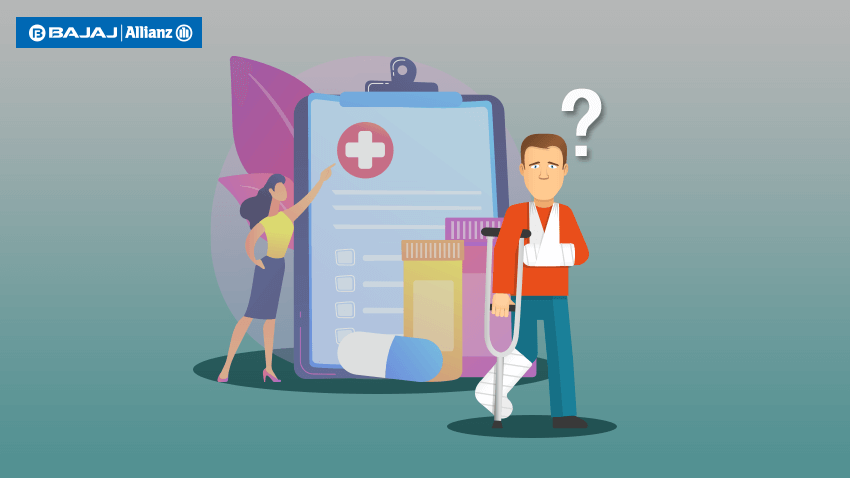When you’re feeling fit and well, it can be hard to imagine a time when you may be too ill to work. Our research has shown that nearly half of over 55s are concerned about serious long-term illness, and almost a quarter worry about serious injury, disability, or redundancy. For under 25s, mental health is a major concern, with 1 in 3 expressing anxiety about their future well-being. This highlights the importance of planning ahead to protect your income.
By planning ahead, you could be eligible for an insurance payout that helps cover bills and essential living costs if you’re off sick. In this article, we explain how Illness and Injury Insurance works and the key considerations of this type of protection policy.
What is Illness and Injury Insurance?
Illness and Injury Insurance, sometimes referred to as income protection, is a type of insurance policy that offers financial support when you can’t work due to injury or illness. Protecting your salary with insurance can help minimize the financial impact if you’re incapacitated. If a valid claim is made, the monthly benefit could be used to help pay your rent or mortgage, bills, and childcare costs while you’re off work, allowing you to focus on getting better rather than worrying about the financial implications.
Why Do You Need Illness and Injury Insurance?
If you are employed and can’t work due to illness, injury, disability, or an accident, you may be able to claim Statutory Sick Pay (SSP). However, this benefit may not cover all of your outgoings, especially if you are the main earner in your household.
Your employer may also pay you contractual sick pay, meaning that you could receive some or all your regular salary when off work sick. While this gives some peace of mind, it is possible that your entitlement to contractual sick pay and SSP could end before you are able to return to work.
It’s important to check your entitlement to contractual sick pay before you apply, so you can make sure that this is the right cover for you. SSP only pays out a maximum of £109.40 per week for up to 28 weeks, which is unlikely to be enough to cover your utility bills, rent or mortgage, and general living costs, especially if you’re off sick when the benefit ends.
Our research has shown that 60% of the average working household has less than £5000 in savings, and 16% have no savings at all, which means it would take 10 years to save their gross annual salary. Illness and Injury Insurance can help you feel financially secure in the event of illness or injury.

Critical Illness Cover vs. Illness and Injury Insurance
Critical Illness Cover pays out a lump sum on a valid claim if you’re diagnosed with or undergo a medical procedure for a specified critical illness set out in your Policy Booklet. You can use your lump sum as you wish, to pay for bills or medical expenses, but once you have received your lump sum, you will no longer be entitled to a further payout, and your policy will end.
With Illness and Injury Insurance, the monthly benefit could be used to help pay for regular bills and living expenses for any illness or injury that prevents you from working.
If you want some advice or help on deciding which product might be right for you, you can call our team of advisers on 0808 302 9428 to talk through your options. They are available between 9 am and 5 pm Monday to Friday. We may record and monitor calls.
Key Considerations of Illness and Injury Insurance
The key consideration when taking out an illness and injury insurance policy is the financial protection you could receive in the event of a valid claim. One of the advantages of this type of policy is that it pays out monthly, so you don’t need to worry about a regular income to cover monthly bills.
Protect Your Income When You Cannot Work
Illness and Injury Insurance provides a monthly payout which can be used to help budget and pay regular bills. This offers financial stability for you and your family, giving you peace of mind when suffering from an illness or injury. However, the benefit is not paid for the first four weeks that you are off work and is then paid monthly in arrears. There is a maximum of 12 monthly payouts per valid claim, and cover ends when you are 60.
Is Illness and Injury Cover Just for the Self-Employed?
As a self-employed person, having some form of insurance to protect you could be invaluable. If you work for yourself, you’re not entitled to some benefits that come with being full-time employed, including paid sick leave and/or SSP.
Therefore, taking out an illness and injury insurance policy can cover you if you can’t work due to illness or injury. This type of cover can be invaluable for full-time employees too, if:
- Your employer doesn’t offer contractual sick pay, or the benefit is less than you need
- You want a safety net to protect your family finances
- You need added peace of mind if you are unwell or suffer an accident or injury
Illness and Injury Insurance is not a savings or investment product and has no cash value unless a valid claim is made. The policy does not include unemployment cover and will not pay out if you become unemployed.
Conclusion
In today’s uncertain world, ensuring financial security during times of illness or injury is crucial. Illness and Injury Insurance offers a practical solution to protect your income and provide peace of mind when you are unable to work. By understanding the benefits and considerations of this insurance, you can make an informed decision that safeguards your financial future.
Whether you are self-employed or a full-time employee, this type of coverage can be an invaluable safety net. It helps cover essential living costs, allowing you to focus on your recovery without the added stress of financial burdens. Planning ahead and securing Illness and Injury Insurance is a proactive step towards maintaining financial stability for you and your loved ones.

